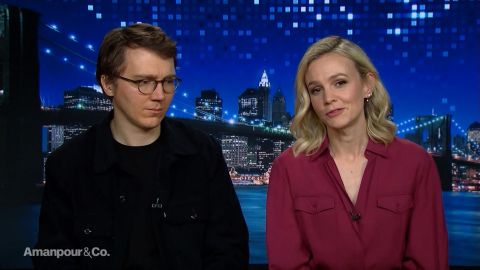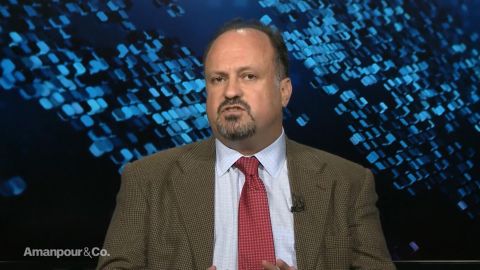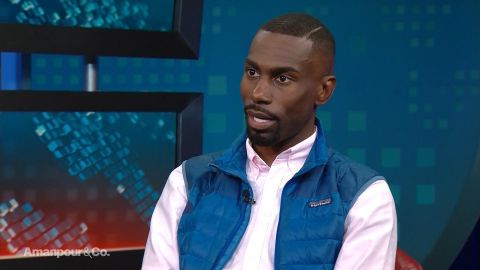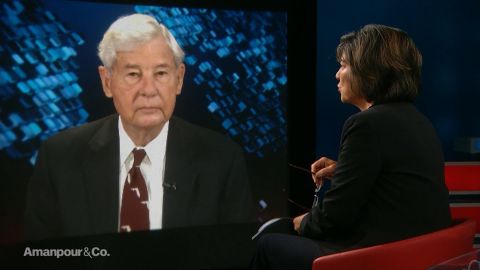Read Transcript EXPAND
ALICIA MENENDEZ: DeRay, thank you so much for joining us.
DERAY MCKESSON, AUTHOR, “ON THE OTHER SIDE OF FREEDOM”: It’s an honor to be here.
MENENDEZ: There are suddenly way too many young Black men who are killed by the police. What was it about Michael Brown’s death that motivated you to get in your car and drive to Missouri?
MCKESSON: You know, I had my own experience with the police in Baltimore about 2009 and (INAUDIBLE) at a traffic stop, and I thought that that was like an isolated experience. I had no clue that this was happening all across the country. And when Mike Brown got killed, I remember hearing the story and being like they killed that kid, you know, a teenage. And I spent my career in public education, it was a like the least that I could do is just go to St. Louis and stand and respond to a call, they said they needed people to come, so I went. Second, I was in St. Louis, it’s the first time that I was tear gassed and that changed everything. It was like I’ve been told that that part of American history was something that we had sort of lived through, that we wouldn’t have to experience, that our generation wouldn’t.
MENENDEZ: Meaning, the civil rights?
MCKESSON: They’re like, you know, the dogs being sick of people and like the teargas. And like I was told that that was in the past and then I lived it. It was like, “Oh, I’ll do whatever I can to make sure that nobody has to experience this again.”
MENENDEZ: And what did you learn on the streets of Ferguson?
MCKESSON: I learned so much. One is that I was one of many people. There were so many people on the street and being a part of that community was actually one of the most important sort of places I’ve ever been, important communities. The second is that people in the streets had gifts already. Part of our work as organizers is helping people find the gift and being able to access that gift. And so there were so many people who’ve never led a meeting, who’ve never led a march, who’ve never had plan before. But like they had those core skills and like we define them. The good thing is I know so much more about the data that I didn’t know before. I know that there are people killed by strangers. This country is killed by police officer. I know so much more about like how accountability works and doesn’t work with regard to policing that I just didn’t know four years ago.
MENENDEZ: How did your lived experience of what happened in Ferguson differ from the imagined experience of what happened in Ferguson?
MCKESSON: It’s interesting. I think that some people think about the protest in Ferguson as like a long weekend. They’re like, “Wow. That like happened.” And, you know, like, no, 40 days, right. It’s a long time. Now, people also forget that in those early days that we saw Martin, it wasn’t that we thought Martin was the cool. It was only going to stand still in Saint Louis in August, September, and October 2014 that we stood still for 45 seconds, we were arrested. I was one of the plaintiffs in the court case that got overturned by the court. And like people forget those things.
MENENDEZ: And what was the theory of why you had to keep moving?
MCKESSON: I think that for the police, the police were like, you know, if we make it, let the leaders stand still and then we’ll just go home. And instead, we were like, “Well, if we’re going to walk all day, we’ll walk all day.” And like that’s where we came. So we walked in circles essentially night and day and like they had to stay out there, marching with us. And I think that they were like not — they weren’t ready for that but we were like, you know, we don’t know everything but we know one thing really well and that’s how Mike Brown should be alive today.
MENENDEZ: When did you realize that that protest was going to become a movement?
MCKESSON: Interesting question. It’s not like I didn’t know. You know, one of the things that was so beautiful about the work that we were all doing is that we had television, right. We were like head down, focus on what’s in front of us. You know Mike Brown’s name. The police killed nine people right after Mike Brown. They killed Kajieme Powell the next weekend right during the day. So there was so much happening that I actually didn’t realize that the world was watching us, until much later, until some of the first wave of protests in India. And I traveled to other places and I was like, “Wow. Like people actually have seen everything that we’ve been doing.”
MENENDEZ: How has the work changed over time?
MCKESSON: You know, I think on the beginning, the beginning was about awareness, right. Like, you know, I know protest isn’t the answer. Protest creates space for the innocent. We were in the street to force people to deal with the issue of police violence, force people to think about systemic violence and state violence. And if we haven’t shut down those streets all across the country, then people would have ignored it. I think that now the question is how do we turn that awareness into impacts. So we think about some of the work that we’ve done around police contracts, it’s like — and laws. In California, there’s a law that says that any investigation of an officer that last more than a year can never resolve the discipline regardless of the outcome. Just wow. In Cleveland, they destroy the police office disciplinary records every two years. And Maryland has a law that says that you can file an anonymous complaint for an officer for everything except brutality. That just doesn’t make sense. So I think there’s a focus now on the data. There’s a focus on policy and structure since we built the awareness.
MENENDEZ: It feels like there is a constant drip drop of these stories both in terms of black individuals killed in their own home, stories about officers being allowed to go back and be on the streets again after an incident.
MCKESSON: Tamir Rice. The officer that killed Tamir Rice who got rehired.
MENENDEZ: Yes. How in the light of that do you keep on?
MCKESSON: You know, mindful that that so much of this work is like how do we uncover and then how do we respond and how do we plan proactively right. Those are sort of the three buckets. The uncover work is work that I think we’ve undertaken to just say like what’s the weapon? We know that it’s like 97 percent of officers are never even like charge, 99 are never convicted, right. So like what we know now is that there are laws, policies, and practices that almost make that impossible. So we’ve been trying to attack those things. We think about the organized in Austin, successfully organized to get the whole city council to vote against the last police contact. And like that was actually really powerful. So I think those things matter. The second is that you talk about the slow drip is that we actually don’t have any great official data on police violence. And like if you get killed in this country by a police officer, and then you (INAUDIBLE), you just don’t exist. So I think the numbers we have are probably underreporting and that’s even more wild. And the third is like, you know, I have this unwavering sense of I hope. I think about hope is a belief that our tomorrow is going to be better than our todays. Well, people say the system is broken and some people respond by saying that like, “Oh, that was designed to be like this.” The takeaway is that it was designed, that people made this up. And because we all made it up, we can make something different, something much better.
MENENDEZ: What’s the difference between hope and faith?
MCKESSON: You know, and King says that the more occupants towards death, that’s about faith. That’s saying (INAUDIBLE). We say the occupants because people been there, that’s hope. Just a reminder that like the world can be better. It will necessarily be better. I always think about hope as a work, not hope is magic.
MENENDEZ: In civil rights history very often, marginalized voices even within the movement, women’s voices, fem voices, clear voices get marginalized, pushed out, and get written out of their history. What responsibility do you think you have to make sure that the women at the center of Black Lives Matter are included in the narrative?
MCKESSON: Yes. I think that you know, in the book, it was important to me to make sure that I highlighted all this civil like you never heard of but without who and there will be no protests. Like what’s so beautiful about the movement is that it was organic, there was no like 1, 2, 3, 10 people that started it but there were so many people who without whom, there will be no space. I write about Mamacad (ph) who made sure that people were fed.
MENENDEZ: (INAUDIBLE), yes?
MCKESSON: Right. I write about Elizabeth Vago (ph) who did incredible art actions. I write about Alexis who helped plan some of the most important things that happened in Saint Louis. It was really present and Brittany Packnett and Johnetta Elzie. All these people who without who, there would actually be no space for us to talk about so that I’m sensitive to that. And I know that the platform that I have, it doesn’t exist just for me, that part of my work is to tell the truth, make sure the truth is amplified and not be arrogant enough to think that I’m the only person that can tell the truth. My work also means that I have to keep the door open and open up as much space as I can because there’s enough space for all of us.
MENENDEZ: The Kavanaugh hearings have forced us to have really difficult conversations about why survivors don’t report and don’t report immediately following an assault. You came forward with your own story. And I wonder if you would tell us a little bit about your process of deciding to share it.
MCKESSON: Yes. You know I was actually sexually abused when I was seven and didn’t talk about it until I was like 11. I write about in the book, I have tweeted about why I didn’t report recently because, you know, we often don’t talk about men who are victims. We just like — that’s like not a part of the conversation. So I wanted to like highlight and model for people what it was like just to have the conversation and remind people that there are male victims. You know when I think about it, in the book I also write about what it means to be a gay black man in this moment. And for all the work that we’ve actually done sort of uncovering stories of people movement work like we actually don’t talk about the gay men in any substance, and ways, and times. I wanted to — it was important for me to write–
MENENDEZ: Why do you think that is?
MCKESSON: You know I think that like the — I think homophobia is like still pretty potent. And you know, you think about westerns and ratio, and I was like there is no march on Washington without westerns, right. There are so many queer black men who also have done a lot of work and like we have to start telling those stories as well.
MENENDEZ: Do you think that’s about homophobia real large or homophobia within the black community?
MCKESSON: I think it is not homophobia within the black community. I think it might be homophobia towards a black man. It’s just like how black — gay black men sort of fall in the hierarchy of power. So yes, I wanted to talk about all of those things because they’re important. They’re part of my story and like they mean something to me.
MENENDEZ: It was interesting to me reading the book because you definitely opened windows into your past and into your private life but not doors. It feels to me like there is a piece of yourself that you are still trying to preserve. And so I wonder if you think that’s fair and if so, why that is?
MCKESSON: You know one of the hard part is that I feel like I’ve lived a public life amongst my peers for a long time. Like I was student body president in college, in high school, and middle school and, you know. And now I’m, you know, living a public life in activism. And there are so few things that are just mine. There are still a few stories, a few things that I’ve not shared before. So the book is sort of hard in some ways because like I was sharing all these things that like used to just be mine, right. Like I just share with people that I intimately do but now I’m talking about them broader. And I think there’s still a few things that are like just mine, that I get to share with. You know, people know about my parents being addicted to drugs and my father raising us. My mother come back when I was 30, left when I was 3, right. Like people know those things. And I wanted to write about that. The reason I wrote about my mom is that I know that we walk into every room carrying more than we name. And one of the things that I walk into rooms carrying is what does it mean to be worthy. That because she left, there’s this question of like anybody could leave. We all carry things into each room and that impacts the way we organize, the way that we build relationships with people, the way that we communicate. So I wanted to model those things. And you know, a part of me will always be that sixth-grade math teacher that is like always trying to like sneak in something that I like want people to pick up and take away.
MENENDEZ: Now, this expression in the book that I love. You write freedom is fragile. And I wonder is that inherent in the nature of freedom or is that about the way that we construct freedom here in the United States.
MCKESSON: It’s a fragile freedom for there to be rules that like you can’t stand still. That like just shows you how like pliable all of this work is. You think about the hundreds of thousands of people purged from the voter rolls in Georgia. That’s like fragile freedom, right. You think about FEMA not doing anything in Puerto Rico of substance. Like that shows you how fragile this is to me. I never want to forget it. Like you can be in enough cool rooms sometimes or like get a cool bang or like have a cool conversation and people that you get lost sometimes about like all the things happening in the world, I never want to forget that. I think freedom is necessarily fragile. So when we fight, we fight not only to win but to protect the women. And the protection part is what people forget. Yes, it’s great to get that new law, great to get a new policy. We need to make sure that that’s not even like overturned in like one year when we’re not paying attention.
MENENDEZ: You had four federal lawsuits —
MCKESSON: Five.
MENENDEZ: — five pressed against you. One was recently dropped. Tell me about the cost of freedom.
MCKESSON: I have had five lawsuits from officers against me. Three from Austin, Dallas, their families and two in Baton Rouge. There’s a movie, you know, (INAUDIBLE) when somebody tweeted a death threat to me. The first person ever permanently banned from Twitter was banned for raising money for trying to get me killed. So there’s a part of me that like knows they want to me to be too afraid to do the work. That’s a part of the strategy is that like I’m always looking on my shoulder, I can’t actually focus. The second is like how do I plan and strategize. So that like I’m mindful of safety but not distracted by it. And there’s always like a fine line. I think some days I’m really good at it, some days, I’m like this —
MENENDEZ: Who is the they? You said they want me to be distracted from the work.
MCKESSON: Well, I think the people — there are a host of other people on the right who feel like, you know, the National Review called me this generation’s race baiter. I think about like their readership. I think about the people who think that like our cause — these things are racist are like being dramatic. The people who say like Colin should just like shut up and play football. Really that whole set of people who are trying to delegitimize both the message in this space are people who are trying to silence both me and ton of other people who are engaged in this work similarly.
MENENDEZ: How do you think we’ll look back on this moment in time?
MCKESSON: Well, I hope that you and I talking when we’re both like 70 and we’re like, “Remember that conversation and we won, right?” That’s what I want us to look back. They can rewrite the tax code on the back of scrap paper, don’t tell me that a mass incarceration is a 400-year solution and we can actually do this. I believe that. It’s why I’m like willing to sacrifice whatever, do whatever because I like think that when I’m like 70, 80, I’ll look back and be like, “That was really hard, pretty dicey, and we won.”
MENENDEZ: DeRay, thanks so much.
MCKESSON: So good to be here.
About This Episode EXPAND
Christiane Amanpour speaks with former U.S. Senator Bob Graham about Saudi Arabia and Princeton Professor Bernard Haykel about U.S.-Saudi relations. Alicia Menedez speaks with activist and author DeRay Mckesson. Christiane Amanpour interviews Paul Dano and Carey Mulligan about the film “Wildlife.”
LEARN MORE



